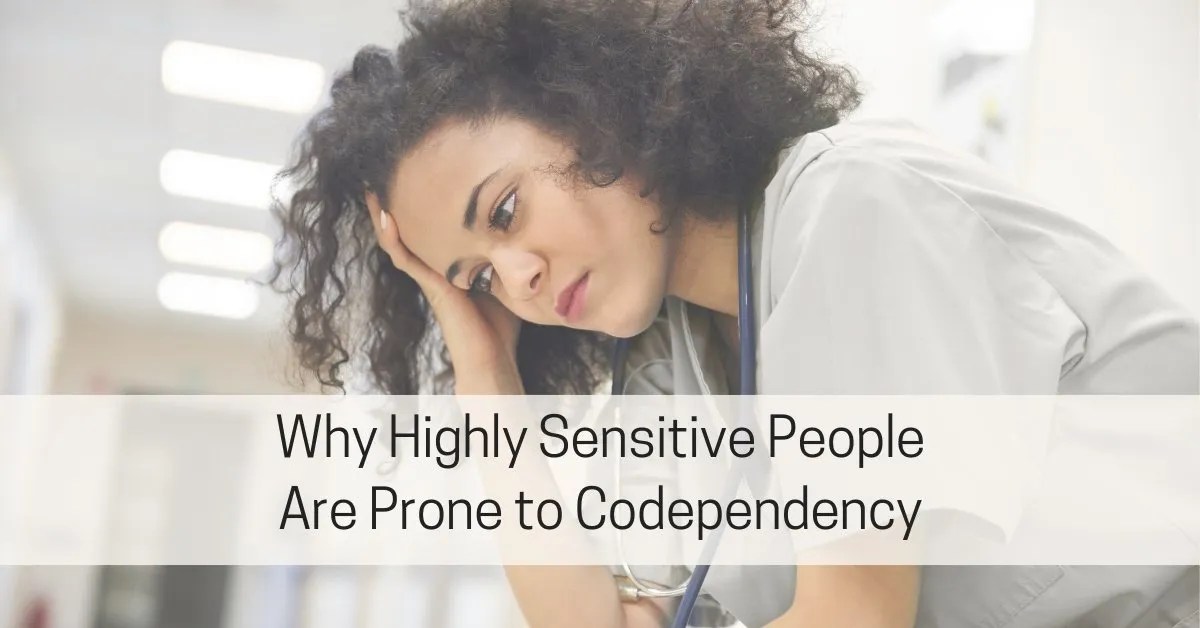Highly sensitive people often feel emotions more deeply and are naturally attuned to the needs of others, but this strength can sometimes lead to codependency. In this post, we’ll explore the link between highly sensitive people and codependency.
What Is a Highly Sensitive Person (HSP)?
Have you been told you’re “too sensitive” or that you “take things too personally?” Do you feel deeply for others, find yourself easily overwhelmed or drained, or cry more easily than most? If so, you might be a Highly Sensitive Person (HSP), someone whose nervous system is especially attuned to the emotional and physical subtleties of the world around them.
High sensitivity is a naturally occurring trait in 20-30% of the population. Dr. Elaine Aron, who coined the term HSP, identified four key aspects of high sensitivity using the acronym DOES.
- Depth of Processing. The central feature of high sensitivity is that you process information more deeply than others. HSPs take in a lot of information and think deeply about it. As a result, you may be slower in making decisions or struggle with transitions. Depth of processing brings insight and empathy, but can also lead to overthinking.
- Overstimulation. Because you notice all thesensory or emotional details around you, like noise, bright lights, and other people’s emotions, you may quickly feel overwhelmed and need strong boundaries and more rest or downtime to cope.
- Empathy/Emotional Reactivity. HSPs are highly attuned to other people’s feelings and have stronger emotional reactions to positive and negative experiences than non-HSPs. HSPs don’t just understand or sense others’ feelings, but often absorb them.
- Sensing the subtle. As an HSP, you probably notice details, small changes, and sensory stimuli that others don’t. This can include being distracted by sounds or smells that don’t bother others, or picking up on shifts in body language, or sensing the energy in a room.
Recognizing that your sensitivity is part of your natural wiring makes it easier to accept your differences and honor your needs without shame. This is especially important if you struggle with codependency, which can also be misunderstood and stigmatizing.
What Is Codependency?
Codependency is a relational pattern in which a person becomes overly focused on others’ needs, emotions, or behaviors, often at the expense of their own well-being. It’s not just about being kind or caring; it’s about chronically abandoning yourself to feel needed, safe, or valued in relationships. It often involves an excessive focus on caretaking, people-pleasing, and trying to control the outcome in order to reduce your own anxiety or discomfort.
For example, let’s say your partner comes home in a bad mood. You immediately try to cheer them up, even though you’re exhausted from your own day. If they stay quiet or distant, you start wondering what you did wrong. You replay the day in your head, looking for clues. Before long, you’re walking on eggshells, adjusting your behavior in hopes of improving their mood, even though they never asked you to.
Codependency is not a diagnosis, but a set of behavioral and cognitive patterns that can show up in any relationship—romantic, familial, or even professional. Some common signs include:
- Feeling responsible for other people’s happiness or choices
- Difficulty saying no or setting boundaries
- Fear of being rejected, disliked, or abandoned
- Guilt or anxiety when prioritizing your own needs
- Feeling valuable primarily when you’re helping, fixing, or rescuing others
Codependency usually begins in childhood, especially in families where emotional needs weren’t consistently met. A dysfunctional family doesn’t have to be chaotic or openly abusive; it can also be emotionally neglectful, unpredictable, rigid, or centered around a parent’s needs rather than the child’s. Children often learn that love is conditional; they have to earn approval by being helpful, quiet, or accommodating, while their own feelings are ignored, dismissed, or punished. They aren’t able to express their emotions, their needs go unmet, and they may end up taking on adult responsibilities—like caring for siblings, emotionally supporting a parent, or managing household stress—because the actual adults are unavailable, overwhelmed, or emotionally unpredictable.
Over time, you learned to suppress your needs and stay hyper-focused on others as a way to stay connected or avoid conflict. This early survival strategy can follow you into adulthood, shaping how you relate to others and how you define your worth in relationships.
Why Are Highly Sensitive People Susceptible to Codependency?
Being an HSP doesn’t automatically mean you’re codependent. But high sensitivity can make you more vulnerable to developing codependent patterns, especially when combined with specific life experiences.
You Feel Others’ Emotions Intensely
HSPs are naturally attuned to other people’s emotional states. You can walk into a room and instantly sense tension. As a child, you might have felt the shift in a parent’s mood before they even spoke. In a dysfunctional family, this emotional awareness can turn into hypervigilance—a constant scanning for how others feel, and a belief that it’s your job to fix it.
You Learned Early That People-Pleasing Creates Safety
If you were a sensitive child in a home where emotions were raw, unpredictable, or suppressed, you may have learned to manage others’ feelings in order to feel secure. This might have meant keeping the peace by self-sacrificing, over-functioning, or reading the emotional temperature in every room. These adaptive behaviors often become the foundation for codependency later in life.
You Were Shamed for Your Sensitivity
Many HSPs grow up being told to “toughen up” or “stop overreacting.” When your emotional needs are invalidated, you learn to suppress and feel ashamed of them. To avoid rejection, you may shift your focus outward, caring for others while ignoring your own needs.
You Mistake Empathy for Responsibility
Because HSPs feel so deeply, it can be hard to tell where your emotions end and someone else’s begin. Without clear emotional boundaries, empathy can become emotional enmeshment, where someone else’s distress becomes your problem to solve. Over time, this can lead to the belief that your role is to regulate or rescue others emotionally, even at your own expense.
You Want Deep Connection, but Fear Conflict and Rejection
HSPs crave deep connections and find conflict, criticism, and rejection extremely painful. Coupled with childhood experiences of conditional love, emotional abandonment, and rejection, such as having to earn our parents’ love, being emotionally neglected, and never being good enough, we’re primed for codependency. Our drive to avoid conflict makes it hard to speak up, say no, or set boundaries, because the discomfort that follows feels overwhelming. Instead, many HSPs accommodate or people-please, trying to maintain harmony at the cost of authenticity.
How Highly Sensitive People Can Overcome Codependency
Being a highly sensitive person doesn’t mean you’re destined for codependent relationships, but it does mean you may need to be more intentional about how you care for others and yourself. You don’t have to stop being empathetic or emotionally attuned. But you can start practicing boundaries that protect your energy, and choose interdependent relationships where your needs matter just as much as anyone else’s. That kind of shift doesn’t happen overnight, but it begins with awareness—and a willingness to stay connected to yourself, not just to everyone else.
Steps toward healing might include learning to differentiate empathy from over-responsibility, setting and upholding boundaries even when it’s uncomfortable, prioritizing self-care, and working with a therapist who understands HSPs and relational trauma.
©2025 Dr. Sharon Martin, LCSW. All rights reserved. Photos courtesy of Canva.com.
Learn More
Publisher: Source link






